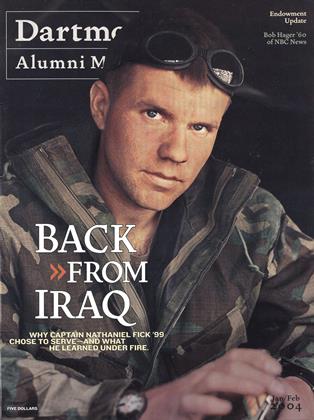The senior fence has turned a comer—specifically the southwest corner of the Green. The two formerly parallel structures along North Main Street are now perpendicular, with a wide opening, at the intersection of Main and Wheelock. The move was designed to reduce pedestrian traffic, which has compacted tree roots in the area. Cost of the move was $20,000, donated by the class of 1956.
The Norris Cotton Cancer Center at Dartmouth-Hitchcock Medical Center has more than doubled its original size with the opening of four new floors for clinical and research staffers. The building now totals more than 100,000 square feet.
Sandra Hoeh has been named community relations director. As DAM reported in its cover story, "A Growing Concern" (Jan/Feb 2003), the role will be critical to improving relations between the College and town. "I have been making as many connections as possible, including neighbors, local Upper Valley officials, and, of course, the College community," says Hoeh. "I have made a commitment to keep people informed and to have a dialogue whenever possible on issues of mutual concern."
The Green is Dean country, according to an October survey conducted by TheDartmouth. Sixty-five percent of students and 96 percent of faculty mem- bers who were among the more than 900 respondents to the poll said they have a negative impression of President Bush; more than a fifth of Republican respondents said they will vote for another candidate. Among Democratic contenders, Howard Dean had the most support (29.8 percent). Wesley Clark and John Kerry were tied for a distant second at 8.8 percent.
Robert Clements '54 and Clements Foundation trustees have donated $2.5 million to endow a Robert Clements professor of democracy and politics. The gift was made to address challenges to democracy around the globe.
"Introductory Arabic" enrollment has almost doubled. The surge "reflects a national trend. A knowledge of the language demystifies a particular culture," says professor Hussein Kadhim.
 View Full Issue
View Full Issue
More From This Issue
-
 Cover Story
Cover StoryBack From Iraq
January | February 2004 By Matthew Mosk ’92 -
 Feature
FeatureIs This Any Way to Make a Living?
January | February 2004 By Bryant Urstadt ’91 -
 Feature
FeatureBrenda and Mindy and Matt and Ben
January | February 2004 By CHRISTOPHER KELLY ’96 -
 Alumni Opinion
Alumni OpinionDollars and Sense
January | February 2004 By Charles Wheelan ’88 -
 Article
ArticleCharting a New Financial Course
January | February 2004 By Jamie Heller '89 -
 Interview
Interview“Responding to Reality”
January | February 2004 By Lisa Furlong
Article
-
 Article
ArticleHeart Attack Fatal
October 1938 -
 Article
ArticleHilliker Essay Prizes Awarded to Three Seniors
JULY 1963 -
 Article
ArticleA Wah Hoo Wah for –
NOVEMBER 1966 -
 Article
ArticleThe Last Adventure
NOVEMBER 1998 -
 Article
ArticleDickey-Lincoln: Who wants it? Who needs it?
September 1978 By Greg Hines -
 Article
ArticleMedical School
JUNE 1964 By PHILIP O. NICE S'47M

